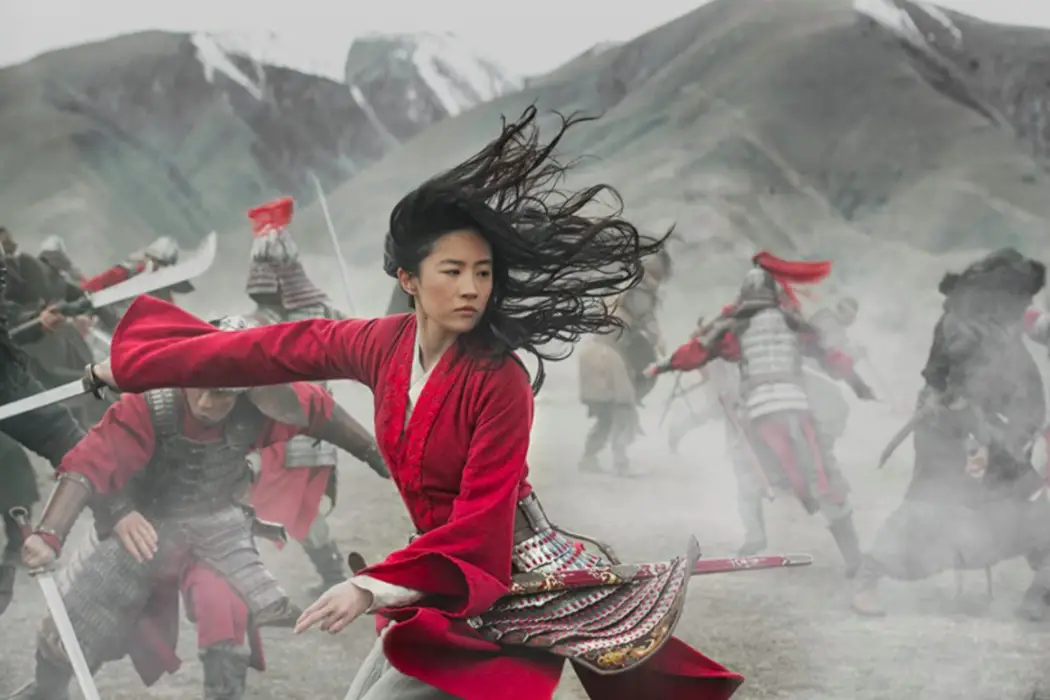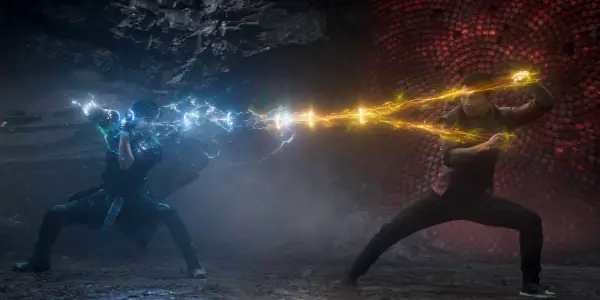Why Are Hollywood’s Asian Stories Scored By White Composers?

Film critic, Ithaca College graduate, University of St Andrews masters…
Joel P. West does the unthinkable with Shang-Chi and the Legend of the Ten Rings: He gives a Marvel film a great score. This thing sings. A mix of wuxia grace and big-budget Marvel brass, the score interweaves authentic Chinese instruments like the erhu, pipa, xiao and dizi flutes, yangqin and guzheng atop tanggu, paigu and bangu drums, lion cymbals, and opera gongs. It’s probably the best Marvel score so far, besides Black Panther. The only problem is its composer. West is not Asian — kind of a red flag when the story’s about a Chinese immigrant returning east to confront his family’s legacy and explore a hidden world of Chinese mythology come to life. This is not an isolated problem, either; most of the people who score Hollywood’s Asian-focused stories are white.
This orchestral cosplay happens every year. Recently, white American composer James Newton Howard scored Raya and the Last Dragon, white English composer Harry Gregson-Williams scored Niki Caro’s Mulan remake, and white Swedish composer Ludwig Göransson scored Turning Red. Mulan and Raya and the Last Dragon are not directed by filmmakers of Asian descent, either, though Raya has writers and other members of the creative team who are.
Orchestral Cosplay
In the past 20 years, the list of Asian-focused Hollywood films scored by white composers dwarfs the list of those same films scored by Asian composers. Iranian-German composer Ramin Djawadi scored the American-Chinese co-production The Great Wall in 2016. English composer Clint Mansell and Scottish composer Lorne Balfe scored the English-language remake of Ghost in the Shell in 2017.
Mansell, Balfe and Djawadi are undeniably huge names in film scoring. Often, a prestigious name assuages criticism. Nobody would think to accuse Hans Zimmer, one of the most celebrated living composers, of whitewashing and fetishizing Japanese culture when he composed, arranged, and produced the score of 2003’s The Last Samurai. (The score was performed by the Hollywood Studio Symphony and conducted by white American composer Blake Neely rather than seeking out Japanese symphonies and conductors.) Zimmer also scored Kung Fu Panda and its myriad sequels and spinoffs with John Powell and Balfe, and Zimmer protégé Henry Jackman scored Big Hero 6.
It’s important to remember that none of these cases is cut and dry. Brian Tyler, a white American composer who typically scores action films, is Justin Lin’s go-to composer, responsible for The Fast and the Furious: Tokyo Drift along with Lin’s subsequent Fast films. His work on Tokyo Drift, a film mostly set among the Japanese underground racing scene albeit with a white protagonist, seems to have emerged from close collaboration with a director who enjoys working with him rather than studio mandate. Tyler would go on to work on Crazy Rich Asians.

Oftentimes, composers will score Asian-produced films between Hollywood projects. Klaus Badelt, for instance, scored 2005’s Chinese production The Promise and would later score the 2016 Chinese-French film The Warriors Gate and the 2017 Chinese fantasy film Legend of the Demon Cat. This established working relationship with Chinese directors in Chinese national cinema makes it more difficult to call out Badelt’s work on Asian-focused American films like 2010’s Shanghai or 2012’s Asian-American–led romantic comedy Shanghai Calling.
Asian Composers In Hollywood
In the 2000s, examples of composers of Asian descent scoring Hollywood productions were few and far between. In 2006, the British Indian composer Nitin Sawhney scored Mira Nair’s adaptation of The Namesake, with heavy Indian musical influences and songs from Indian-American musician Mitali Banerjee Bhawmik. The same year, for Wendy Wu: Homecoming Warrior of all things, first-generation Chinese-American composer Nathan Wang composed the theme music. Much later, in 2018, Asian-American composer Joe Wong scored the Netflix adaptation To All the Boys I’ve Loved Before.
Auteurs seem to hold some sway here. For Silence in 2016, Martin Scorsese worked with Korean-American composer Kim Allen Kluge and his (white) composing partner and wife, Kathryn Kluge. While Bong Joon Ho worked with Marco Beltrami on his first English-language film, Snowpiercer, he brought aboard South Korean composer Jung Jae-il for his second American film, Okja. Wes Anderson’s Isle of Dogs, from 2018, is more of an odd duck — the score’s composed by Alexandre Desplat, who is very much not of Asian descent. However, the taiko drumming, instrumental to the film’s score, was written and performed by New York-based Japanese musician Kaoru Watanabe, and several other songs on the film’s soundtrack were written and performed by Japanese musicians as well.
Film Scoring As An Industry
While the scores to these films from white composers could be accused of whitewashing or appropriating Asian culture, the fault should not typically lie with the composers. Established names like Zimmer, Mansell, Balfe, and Djawadi share more of the blame, as they likely have the privilege of choosing their projects more selectively. Newer composers, on the other hand, don’t have the same options available to them and may work on Asian-produced films alongside English-language ones.
The onus ultimately falls on the industry of film scoring in general, an industry looking increasingly adverse for composers. Streaming services such as Netflix are trying to cut out royalties from composer contracts, and there’s no union to buoy the composers.
A 2022 article in Vanity Fair laid bare these problems. Among the issues of royalties being gutted and a lack of unionization, the system of “ghost composing” and hyper-collaboration presents serious problems for composers hoping to break into the industry.
New composers likely go uncredited as they ghostwrite musical cues for scores. Zimmer, for instance, runs the Remote Control studio in Santa Monica, where an army of talented composers devise his cues for him and essentially write the music that eventually gets the “Score by Hans Zimmer” label on it, though the process is opaque and it’s unclear how much of his own composing Zimmer does.

The system has given rise to composers like Powell, Gregson-Williams, Balfe, and Jackman, who rose out of the Zimmer factory. But for everyone else, ghost composers tend to make minimum wage, and their royalties are split, reportedly 50-50 per cue, with the lead composer. Combine that with long hours, no overtime pay, and a constant hunger for new work, and it’s clear that the system of Hollywood scoring is a hostile and nearly impenetrable machine.
This exploitative system leads to a gate-kept industry of film composers that privileges those who can withstand the arduous process of working under a major name like Zimmer and emerge as lead composers. The endless push to get solid cues in on time also encourages the recycling of what worked last time, leading to so many film scores that sound the same and so little room for new or international voices and sounds. And when a studio needs a score composed quickly and efficiently, it’s likely going to shop it to one of these composition megaliths before asking an independent composer, causing the cycle to repeat. That’s why it takes a director with clout like Scorsese, Bong or Anderson to disrupt the system and enlist a composer with the same background and experiences as the characters whose stories they’re telling.
Conclusion
Film composition is not like acting or writing — a composer can turn out a very good score, as West does with Shang-Chi, solely operating on research, inspiration, and smart connections. West, for example, spent months researching traditional Chinese music, wrote his music to the traditional pentatonic scale, and utilized the UK Chinese Ensemble for much of the authentic Chinese instrumentation.
But for years, audiences, filmmakers, and studios have been satisfied with letting white composers score Asian-led stories about Asian heritage. These scores have been reductive and simplistic, fostering a stereotypical idea of the Asian diaspora while also fetishizing Asian cultures.
The push from audiences, especially activists and cinephiles, in the past 10 years to diversify Hollywood has yielded marked changes in front of the camera, to be sure. Significant fan outcry and online petitions spurred Disney to search for a Chinese actress for the role of Mulan in the remake, and Marvel, a subsidiary of Disney, subsequently pushed for a Chinese actor (in Simu Liu) for the role of Shang-Chi. Shang-Chi and other blockbusters like Crazy Rich Asians and Mulan are some of the largest Hollywood films to feature majority–Asian diaspora casts. The dedication to groundbreaking representation does not seem to extend far beyond the actors on-screen. These films are all scored by white composers. The tools for articulating Asian cultures and histories are being kept out of the hands of Asian and Asian-American composers, and that needs to change.
What do you think of white composers scoring Asian stories in Hollywood? Comment below with your thoughts.
Does content like this matter to you?
Become a Member and support film journalism. Unlock access to all of Film Inquiry`s great articles. Join a community of like-minded readers who are passionate about cinema - get access to our private members Network, give back to independent filmmakers, and more.
Film critic, Ithaca College graduate, University of St Andrews masters student, head of the "Paddington 2" fan club.













